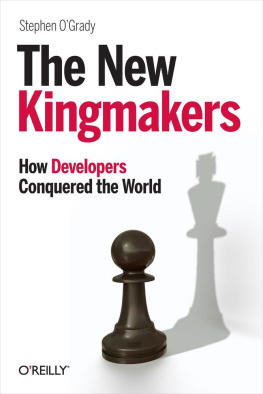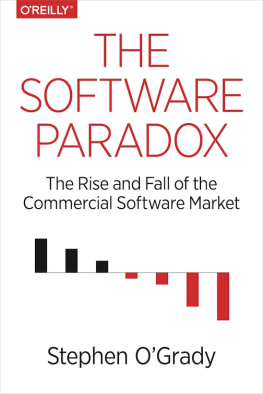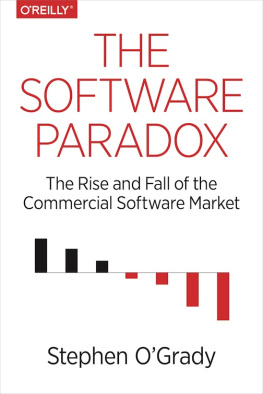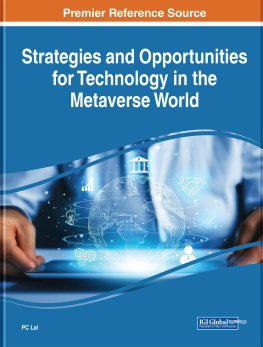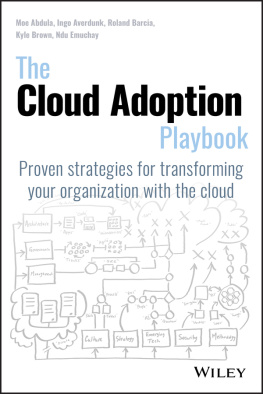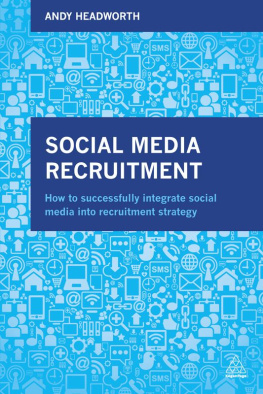Stephen OGrady - The New Kingmakers: How Developers Conquered the World
Here you can read online Stephen OGrady - The New Kingmakers: How Developers Conquered the World full text of the book (entire story) in english for free. Download pdf and epub, get meaning, cover and reviews about this ebook. year: 2013, publisher: OReilly Media, genre: Business. Description of the work, (preface) as well as reviews are available. Best literature library LitArk.com created for fans of good reading and offers a wide selection of genres:
Romance novel
Science fiction
Adventure
Detective
Science
History
Home and family
Prose
Art
Politics
Computer
Non-fiction
Religion
Business
Children
Humor
Choose a favorite category and find really read worthwhile books. Enjoy immersion in the world of imagination, feel the emotions of the characters or learn something new for yourself, make an fascinating discovery.
- Book:The New Kingmakers: How Developers Conquered the World
- Author:
- Publisher:OReilly Media
- Genre:
- Year:2013
- Rating:4 / 5
- Favourites:Add to favourites
- Your mark:
- 80
- 1
- 2
- 3
- 4
- 5
The New Kingmakers: How Developers Conquered the World: summary, description and annotation
We offer to read an annotation, description, summary or preface (depends on what the author of the book "The New Kingmakers: How Developers Conquered the World" wrote himself). If you haven't found the necessary information about the book — write in the comments, we will try to find it.
The New Kingmakers documents the rise of the developer class, and provides strategies for companies to adapt to the new technology landscape. From recruiting to retention, it provides a playbook to work more efficiently and effectively with the most important members of your organization.
The New Kingmakers: How Developers Conquered the World — read online for free the complete book (whole text) full work
Below is the text of the book, divided by pages. System saving the place of the last page read, allows you to conveniently read the book "The New Kingmakers: How Developers Conquered the World" online for free, without having to search again every time where you left off. Put a bookmark, and you can go to the page where you finished reading at any time.
Font size:
Interval:
Bookmark:

Beijing Cambridge Farnham Kln Sebastopol Tokyo
To my parents, who taught me to always do my job by always doing theirs.
If you purchased this ebook directly from oreilly.com, you have the following benefits:
DRM-free ebooksuse your ebooks across devices without restrictions or limitations
Multiple formatsuse on your laptop, tablet, or phone
Lifetime access, with free updates
Dropbox syncingyour files, anywhere
If you purchased this ebook from another retailer, you can upgrade your ebook to take advantage of all these benefits for just $4.99. to access your ebook upgrade.
Please note that upgrade offers are not available from sample content.
Not very long ago, developers were primarily seen through the geek lensas smart people that were too idiosyncratic and unsociable to be taken seriously or capable of wielding much influence. Now thats all changed as developers have attained a new status as the real movers and shakers who hold more power and influence than is known. In high-tech circles, this has opened up an ongoing conversation about how the shifting role of developers is affecting todays IT organizations.
This phenomenondescribed with terms like The Consumerization of IT , The Nerd Economy , and The Rise of the Developer is what Stephen OGrady discusses in his book, The New Kingmakers: How Developers Conquered the World . In it, Stephen explains how this shift began and how it will shape the future of business, as a whole, in the years to come. He takes a data-driven, realistic look at the new realities facing todays IT organizations and the role that development teams are playing in creating them.
At New Relic, weve written a lot about The Nerd Economy and how its leading us in a new direction. Developers are now wielding unprecedented power. Polyglot environments, database fragmentation, and cloud and open source adoption are only the beginning. As developers, we are shaping product and user experiences in new ways. And organizations that understand and embrace the value of this shift will be the most successful in the years to come.
Today, developers are unquestionably one of the most important assets a business has, regardless of what industry it is in. This book documents developers movement out of the shadows and into the light as new influencers on society. It also reveals the larger truth that not just company leaders, but also developers themselves must recognize the role they play in business success. Thus, this new era offers us exciting and unprecedented opportunity: to take pride in our newfound status and ownership of the responsibilities it brings.
Lew Cirne
CEO, New Relic
In 2002, a group of securities-industry CIOs and IT managers were interviewed about their challenges and strategies with regulatory compliance. Specifically, they were asked about their compliance strategies regarding the usage of instant messaging (IM) technologies, a communication channel that predates the Internet, but exploded in popularity as the Web grew. Because IM allows users to communicate quickly and efficiently with each other in real time for free, it found no shortage of users, or use caseseven in the heavily regulated securities industry.
When the executives were interviewed, however, every single one denied that their organization had any compliance obligations with respect to IM. They were certain of this because they were equally certain that IM was not being used. How were they so sure? We havent issued those technologies, so theyre not being used by our employees, was the typical response. The reality, however, was an unpleasant surprise to these execs. IM technologies might not have been issued by these companies, but with the technologies freely available and highly useful, their use by company employees was rampant and accelerating.
This revelation was to become more and more common over the following decade, however, because the nature of technology adoption was changing. Access to technology has been steadily democratized over the past decade, to the point that, as then CEO of technology provider rPath Billy Marshall put it in 2008, The CIO is the last to know. The following Venn diagram depicts the current reality in simple fashion.
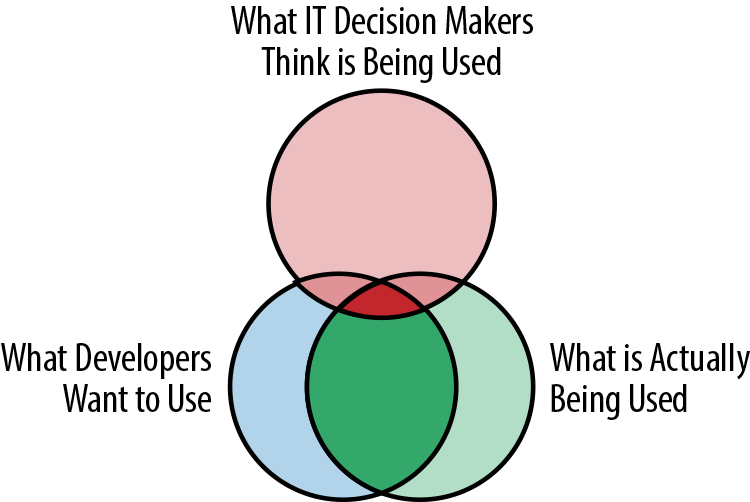
This recalibration of the practical authority wielded by IT decision makers has profound ramifications for everyone in or around the technology industry, as well as those businesses that consume technologywhich today is virtually every business.
For years, medium-to-large-sized businessescolloquially referred to as enterprise buyerswere the primary consumers of technology, the economic engine that drove technical innovation. Unsurprisingly, the output of the technology industry reflected these buyers needs and desires, at the expense of other considerations. Usability was a secondary concern; features like manageability and security were far more important to CIO buyers. Sales and marketing efforts, meanwhile, were crafted around promises of return on investment or labor reduction, rather than personal appeal. Theres a reason the iPhone is an order of magnitude easier to use than the average business software application. Apple needed to convince each customer on the virtues of a given device. Enterprise technology vendors needed to sell only to the one buying the software. If the employees found the products difficult to use, so be it.
In an industry where usage is a function of purchase rather than a real desire for the item, technology providers will obviously optimize for the purchasing process. But in reality, that is no longer true today, and hasnt been true for years. As with IM or the iPhone, technology is increasingly being driven by bottom-up, rather than top-down, adoption. The world has changed, but only a select few in the technology industry have realized it. As William Gibson might put it, the future is already here, its just unevenly distributed.
What does the market think of this new, non-enterprise focused future-present? Currently, Apple is the most valuable technology company in the world, and depending on the price of oil when you read this, the most valuable company in the world, period. As this book goes to press, in fact, Apple is worth more than Adobe, Cisco, Dell, EMC, HP, Oracle, SAP, Red Hat, Sony, and VMwarecombined.
In the wake of Apples unprecedented success, one obvious question remains: if IT decision makers arent making the decisions any longer, who is calling the shots?
The answer is developers. Developers are the most-important constituency in technology. They have the power to make or break businesses, whether by their preferences, their passions, or their own products.
Consider the rogue or shadow IT departments that are busily metastasizing within organizations large and small all over the planet, simply because they can. These informal, non-sanctioned IT departments handpick, build, and maintain their own technology stackstechnology stacks into which centralized IT has no visibility, and over which it has no control. The result is a world in which Coca Cola or Ford or JP Morgan arent the customers any more: their employees are. Vendors are becoming aware that their future relevance and viability will depend not on their salespeoples willingness to let the CIO beat them at a round of golf, but their ability to get the rank and file to genuinely value their technologies. As well see, those that manage this transition most successfully turn sales from a costly and complex negotiation to a fait accompli.
Font size:
Interval:
Bookmark:
Similar books «The New Kingmakers: How Developers Conquered the World»
Look at similar books to The New Kingmakers: How Developers Conquered the World. We have selected literature similar in name and meaning in the hope of providing readers with more options to find new, interesting, not yet read works.
Discussion, reviews of the book The New Kingmakers: How Developers Conquered the World and just readers' own opinions. Leave your comments, write what you think about the work, its meaning or the main characters. Specify what exactly you liked and what you didn't like, and why you think so.

